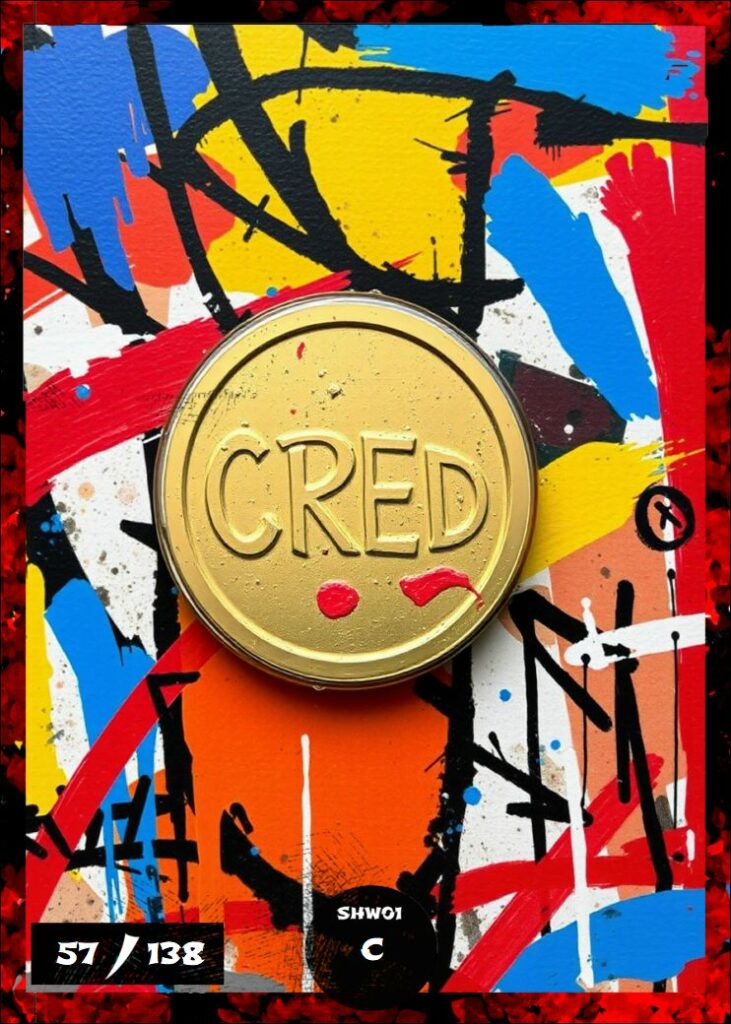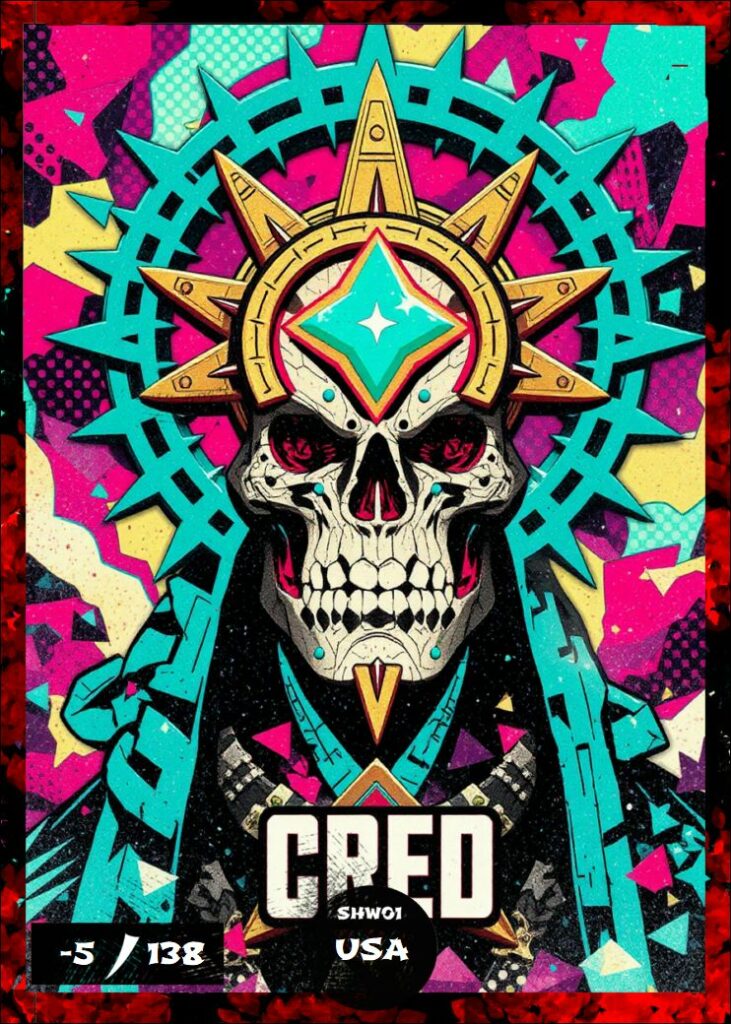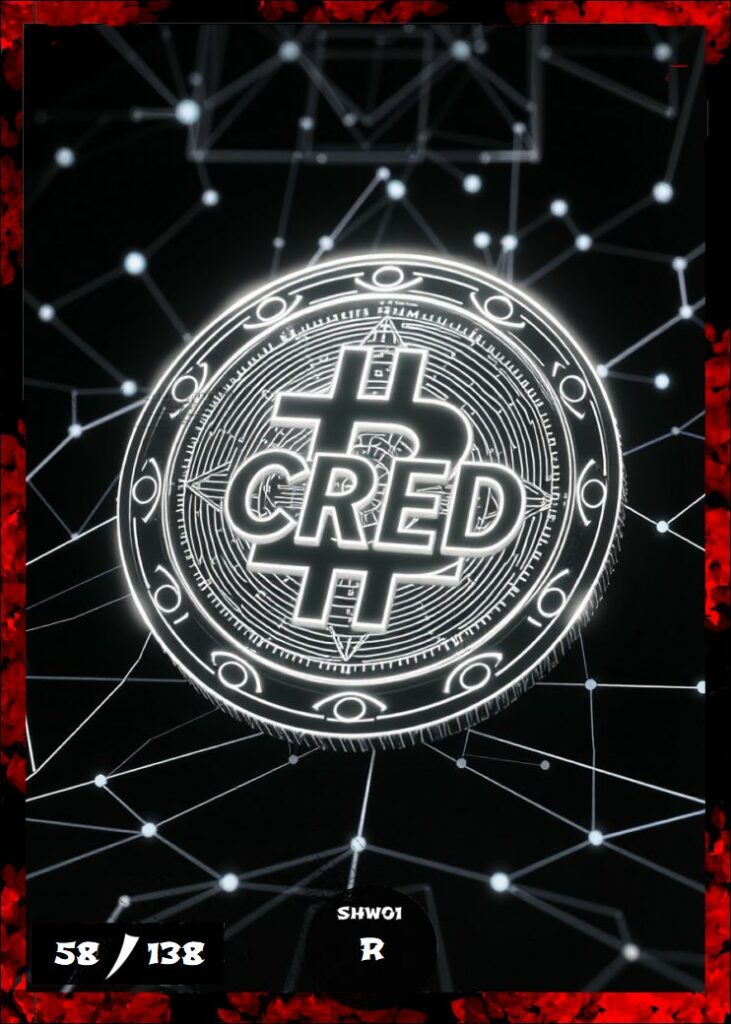


Celebrity Parody Showdown
Rules of Play
Introduction
Welcome to Celebrity Parody Showdown (CPS), a fast-paced card game of star-powered clashes, hilarious takedowns, and strategic resource management. In CPS, players pit their stable of Influencers against each other, using cunning tactics, response plays, and the accumulation of CRED to come out on top. Earn Body Counts by “cancelling” your opponents’ Influencers—collect 10 to claim victory!
Important Note:
If a rule on a card conflicts with these general rules, the card’s text takes precedence. Certain cards are designed to break or bend the standard rules. For example, if the card “RONALD FRUMP” states that cancelling an Influencer grants you 2 Body Counts instead of 1, you follow the card’s instruction.
Components
- 1 Media Tyrant Card (per player):
Determines your deck-building constraints by listing which Domains your Influencers and Player cards must belong to. - 10 Influencer Cards (per player):
Each Influencer has Life, Damage, CRED, and possibly unique abilities. These form your Influencer Deck. - 40 Player Cards (per player):
These include SWAG, Physical Damage, Public Image (ACTION-speed) and Burner, Emotional Damage (RESPONSE-speed) cards. They enhance your attacks, defend your Influencers, and manipulate the game state. - CRED Bank Tracker:
Represented by dice, tokens, or counters that track how much CRED you have accumulated. - Cancelled Pile:
A shared area where Influencers and used Player cards go once they are “cancelled” or played out. - Dice or Counters for Damage:
Used to track damage on Influencers.
Setup
- Choose Media Tyrant:
Each player selects one Media Tyrant card, which dictates the allowed Domains for Influencers and Player cards in their deck. - Build Your Decks:
Each player’s deck consists of:- 10 Influencer cards (forming an Influencer Deck)
- 40 Player cards (forming a Player Deck)
All Influencer and Player cards must match a Domain allowed by your chosen Media Tyrant.
- Shuffle Decks:
Shuffle your 10 Influencer cards into a face-down stack.
Shuffle your 40 Player cards into a separate face-down deck. - Draw Starting Hands:
Each player draws the top 5 cards from their Player deck. Keep these hidden from your opponent. - Reveal Starting Influencers:
Each player flips the top card of their Influencer deck face-up into the Showdown Arena. These are now the active Influencers facing off. - Determine Priority:
Decide which player begins the first ACTION by any agreed method (high roll, coin flip, rock-paper-scissors).
You’re now ready to play!
Game Flow: Actions & Responses
CPS is not turn-based in the traditional sense. Instead, the game proceeds as a series of ACTIONS taken by each player in turn, with the opponent able to respond.
The ACTION Sequence (When It’s Your Turn)
- Hand Refill (If Needed):
At the start of your ACTION, if you played any cards during your previous ACTION, you now draw back up to 5 cards from your Player deck. If you did not play any cards last time, your hand should already be at 5 (assuming no external effects). - Collect CRED:
Add to your CRED bank the amount of CRED shown on your current Influencer card. Your CRED accumulates over the course of the game and does not reset between ACTIONS.
(Exception: In sudden death scenarios, the bank resets.) - Play One ACTION-Speed Card (Optional):
You may pay the required CRED from your bank to play one ACTION-speed Player card (SWAG, Physical Damage, or Public Image).- You can choose not to play a card.
- You cannot play more than one ACTION-speed card during your ACTION. You may play RESPONSE speed cards if you are responding to a RESPONSE card your opponent played.
- Opponent Responses:
Once you declare an action (such as playing a card or attacking), your opponent may play RESPONSE-speed cards (Burner, Emotional Damage) if they have the CRED to pay for them.- Multiple RESPONSE cards can be chained as long as long as they have a valid target and the CRED required is payed.
- You may respond to their response (with RESPONSE-speed cards of your own) as long as you can afford it. This allows “back-and-forth” chains of responses.
- Attack:
You cannot attack the 1st action of the game. After deciding on your one ACTION-speed card (or skipping it) and resolving any responses, you attack with your Influencer. Calculate damage based on the Influencer’s Damage stat and any modifiers from played cards. - Check for Cancellation:
If the total damage on an Influencer is equal to or greater than its Life stat, that Influencer is “cancelled” and moved to the Cancelled pile.- If you cancelled an opponent’s Influencer, you gain 1 Body Count (or more if a card effect states otherwise).
- The opponent immediately reveals the next top card of their Influencer deck and places it into the Showdown Arena.
- Any Player cards you played this ACTION are also moved to the Cancelled pile at the end of the ACTION.
- ACTION Ends:
After the attack and resolution of all responses, your ACTION ends. The opposing player now takes their ACTION, following the same steps.
Card Speeds: Action vs. Response
Card Speed Overview
In Celebrity Parody Showdown, the speed of a card determines when it can be played during gameplay. Card speeds are divided into two categories: ACTION-speed and RESPONSE-speed.
- ACTION-Speed Cards:
- When They Can Be Played:
- ACTION-speed cards may only be played during your own ACTION phase.
- Card Types:
- Swag Cards: Attach to your Influencers during your ACTION.
- Physical Damage Cards: Deal direct damage to opponents’ Influencers or modify damage stats.
- Public Image Cards: Establish your Public Image as part of your overall strategy.
- Limitations:
- You may play only one ACTION-speed card per ACTION unless otherwise specified by a card or ability.
- When They Can Be Played:
- RESPONSE-Speed Cards:
- When They Can Be Played:
- RESPONSE-speed cards can be played as your one card during your ACTION phase (but it is treated as an ACTION speed card then) or at any time during your opponent’s ACTION phase allowed, allowed responses include:
- An opponent playing an ACTION-speed card.
- An opponent attacking with their Influencer.
- RESPONSE-speed cards may also be played during chains of responses initiated by either player.
- RESPONSE-speed cards can be played as your one card during your ACTION phase (but it is treated as an ACTION speed card then) or at any time during your opponent’s ACTION phase allowed, allowed responses include:
- Card Types:
- Emotional Damage Cards: Provide defensive or disruptive effects to mitigate your opponent’s strategy.
- Burner Cards: Target specific game elements for removal or add tactical counters to your opponent’s plays.
- Limitations:
- Multiple RESPONSE-speed cards may be played in sequence as long as you have enough CRED to pay for them and they have legal targets.
- When They Can Be Played:
Player Card Types
ACTION-Speed Cards
- Swag Cards
- Description:
Swag cards represent accessories, tools, or other thematic items that enhance your Influencers. They provide lasting buffs or unique abilities while attached. - Rules:
- Swag cards are attached to Influencers when played.
- Each Influencer can have only one Swag card attached at a time.
- You can pay 1 CRED to send a Swag card attached to your Influencer to the Cancelled Pile, freeing up the slot for another Swag card. This is known as RECYCLING, and paying the RECYCLING FEE.
- Description:
- Physical Damage Cards
- Description:
These cards deal direct damage to an opponent’s Influencer or enhance the attack capabilities of your own Influencer. - Rules:
- Played during your ACTION phase to amplify your attack or weaken an opponent’s defense.
- Description:
- Public Image Cards
- Description:
Public Image cards represent overarching strategies, themes, or campaigns that define your playstyle. - Rules:
- Only one Public Image card may be in play at a time (per game, not per player).
- If you play a Public Image card while another is in play, the existing Public Image card is cancelled and sent to the Cancelled Pile.
- Your Public Image card can also be cancelled by opponent effects or by them playing their own Public Image card.
- Description:
RESPONSE-Speed Cards
- Emotional Damage Cards
- Description:
Emotional Damage cards disrupt your opponent’s strategy, reduce damage taken, or otherwise create opportunities for counterplay. - Rules:
- May be played at Action speed during your ACTION phase as your 1 Action card.
- Played in response to opponent actions, such as their attack or the play of an ACTION-speed card.
- May also be used in RESPONSE chains to counter other RESPONSE-speed cards.
- Description:
- Burner Cards
- Description:
Burner cards are highly tactical and serve to remove or neutralize game elements, such as attached Swag cards, Public Image cards, or even active Influencers. - Rules:
- May be played at Action speed during your ACTION phase as your 1 Action card.
- Played during your opponent’s ACTION phase in response to their plays or existing game conditions.
- Must target a specific game element (e.g., a Swag card, Public Image card, or ability).
- Description:
Winning the Game
You win by accumulating 10 Body Counts.
- Each time you cancel an opposing Influencer, you add 1 Body Count unless stated otherwise by a card effect (e.g., “RONALD FRUMP” might give you 2 Body Counts per cancellation).
- Running out of Player cards does not cause you to lose. If you have no Player cards left, continue attacking with your Influencers each ACTION.
Special Rules & Tie Situations
- No Deck-Out Loss: Running out of Player cards does not lose you the game. You simply continue attacking with your Influencers.
- Tie Conditions (Sudden Death):
If both players reach a tie (e.g., run out of Influencers simultaneously without either reaching 10 Body Counts), each player chooses one of their cancelled Influencers and returns it to the Showdown Arena.- Determine Priority again.
- Both players reset their CRED banks to zero.
- The game resumes under sudden death. Players may still use any remaining Player cards, and the first player to cancel the opponent’s Influencer now wins.
Influencer Abilities
Influencers may have abilities that are static, passive, or triggered by certain events. They may also specify whether the ability is ACTION-speed or RESPONSE-speed.
- Static/Passive Abilities: Always in effect unless otherwise stated.
- Triggered Abilities: Activate when conditions are met (e.g., “When this Influencer is revealed, gain 2 CRED”).
- Speed-Based Abilities: If an ability specifies ACTION-speed, it can only be used during your ACTION. If it specifies RESPONSE-speed, it can be used at the appropriate timing in response to opponents. If it is not mentioned on the card the speed on an INFLUENCER ability is defaulted to ACTION speed. If you use an ACTION speed ability during your ACTION phase this counts as your ACTION and you may not play any ACTION speed cards.
Remember: Card text overrides these rules. Always follow the card’s instructions if it conflicts with standard procedures.
Deck Construction & Domains
- Your Media Tyrant card lists which Domains you may include in your deck.
- Each Influencer and Player card in your decks must belong to a Domain allowed by your Media Tyrant.
- You must have exactly 10 Influencers and 40 Player cards.
With these rules, you’re ready to enter the world of Celebrity Parody Showdown. Build your deck, manage your CRED, outplay your opponent with timely responses, and claim those Body Counts to secure stardom and victory!




Tournament Rules & Official Play
Valid Card Ownership & NFTs
Celebrity Parody Showdown (CPS) tournament play requires that each participant owns the Non-Fungible Token (NFT) versions of all the cards included in their tournament deck. This ensures the legitimacy, authenticity, and fairness of sanctioned events. Before registering for a CPS official tournament, players must:
- Deck Wallet Verification:
Each card in your physical tournament deck must correspond to a valid NFT within your personal deck wallet. Tournament organizers will verify that every card you intend to play is represented digitally as an NFT you own. - Printing & Proxies:
Unlike traditional TCGs that rely solely on printed cards, CPS embraces a hybrid model. Once you own the NFT of a card, you are authorized to print a physical copy for use in official play. To facilitate this, we offer a subscription-based service allowing players to access official, high-quality proxy templates from our website for a small monthly fee. These templates help ensure uniformity and standardization of the physical cards at tournaments.- Uniform Printing Guidelines:
All cards in your deck must be printed uniformly to maintain fairness and prevent marked cards. For example, printing on standard paper and placing that printout in front of another card inside a sleeve is acceptable. Card backs must be indistinguishable from each other, and the entire deck must be easily shuffled without revealing information. - Quality & Legibility:
While printing methods may vary (home printer, local print shops, etc.), the card text, artwork, and stats must be clear and legible. Illegible or damaged prints may be disqualified at the discretion of tournament judges.
- Uniform Printing Guidelines:
Acquiring Cards & NFTs
CPS aims to lower entry barriers and encourage eco-friendly practices by separating card ownership (as NFTs) from physical printing. Players can earn and obtain NFT cards in multiple ways:
- Digital Gameplay:
By playing our upcoming digital version of CPS, players can earn or purchase NFTs directly. Winning digital matches or participating in online events may grant you special NFT cards or packs. - NFT Booster Packs:
We will periodically sell NFT booster packs containing randomized card NFTs, similar to traditional card packs. Players can open these packs digitally, then freely trade, sell, or transfer the NFTs on secondary markets. - Secondary Market & Cottage Industries:
Because the value lies in the NFT ownership, players are free to find their preferred printing solutions. This model supports small printing businesses and custom card shops, encouraging cottage industries to thrive. These authorized printers can help players produce high-quality physical cards from their owned NFTs, fostering a community-driven ecosystem.
Sanctioned Events vs. Unofficial Play
- Official Tournaments:
All official CPS tournaments require strict deck wallet verification to ensure all participants have legitimate access to their card NFTs. If you do not hold the appropriate NFTs, you cannot compete in sanctioned events. - Unofficial Events & Enforcement:
While casual, unsanctioned gatherings are encouraged, we reserve the right to take action against any events that present themselves as official CPS tournaments without enforcing the NFT ownership requirements. Any attempts to subvert the NFT verification system—for example, mass-producing cards without NFT backing—will be addressed promptly. These measures protect the integrity of the competitive environment and honor the investment of players who legitimately acquire NFTs.
